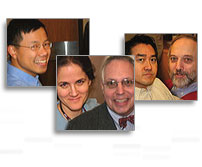
| | Collaborations | | Data Sharing Network (SHRINE) | | |||
| | |||||||
| | In their application for CTSA status, Harvard Medical School (HMS) proposed creating a web-based sotware network (based on the prototype model SPIN, Shared Pathology Informatics Network) that would alllow the participating Harvard hospitals to link their respective i2b2 instances for the sharing of obfuscated, aggregated counts of patients meeting selected inclusion and exclusion criteria for demographics, diagnoses, medications, and labs. It was envisioned that this network, called SHRINE (Shared Health Research Informatics NEtwork), would greatly enable population-based research, assessment of potential clinical trials cohorts, and hypothesis formation for followup study by combining the EHR assets across the hospital system. Through a collaboration between i2b2 and HMS a technical demonstration of that network using dummy data went live in 2009, four months before HMS was granted CTSA status. Following refinement of the technical architecture and development and institutional approval of Business Rules and Terms of Access, the full up operational network, now an integral part of the Harvard CTSA (Catalyst), went live to qualified users January of 2011. At the current time five of the Catalyst hospitals (BIDMC, CHB, BWH/MGH, and the Dana Farber Cancer Center) actively participate in this network. The software, which is totally open source is now freely available at http://open.med.harvard.edu/display/SHRINE/Community and has been adapted and adopted by several groups seeking to build and use large databases from disparate sources. The first invitational SHRINE Conference, Guiding the Emergence of Bottom-up EHR-Driven National Research Networks (https://cbmi.med.harvard.edu/shrine2011), was hosted by Catalyst at the Center for Biomedical Informatics at the Countway Library of Medicine June, 2011 (LINK); the 2012 meeting will be hosted at HMS July 25-26, 2012. SHRINE is currently in play or under consideration at other sites as follows: i2b2-CICTR (Cross-Institutional Clinical Translational Research project), led by University of Washington PI Nick Anderson and funded as a two year (11/08-9/10) CTSA supplement, set up a SHRINE network to create an information exchange environment that successfully shared 4.2M deidentified patient records. The network successfully linked i2b2 sites at UW, UCSF, UC Davis and Harvard Catalyst. Recombinant Data Corporation was actively involved in this implementation. CARRAnet (Childhood Arthritis and Rhematological Research Alliance), funded principally by NIAMS, is employing SHRINE to assemble the largest to date registry of pediatric patients with rheumatic disease across a 60 site network. As of February 2012, CARRAnet is adding 300 subjects/month to the 6,500 currently enrolled. The group is planning a consolidated postmarketing surveillance study that would ultimately include 30,000 pediatric RA patients. https://carranetwork.org. The Harvard IBD Longitudinal Data Repository is a privately funded enterprise that is using SHRINE to build a registry of pediatric and adult inflammatory bowel disease across Children's Hospital Boston, Brigham and Women's Hospital and the Beth Israel Deaconness Medical Center. The Pediatric IBD Network (ImproveCareNow Enhanced Registry), sponsored by AHRQ, is using SHRINE to build a 30 geographic site, modular pediatric chronic disease registry for Quality Improvement and Clinical Effectiveness research. https://improvecarenow.org. IMI-EHR4CR (Electronic Health Records for Clinical Research), a European public-private (pharmaceutical industry) partnership, is evaluating SHRINE for linking their network. This four year project with 33 partners aims to provide adaptable/reusable and scalable solutions for reusing EHR data for clinical research. http://www.ehr4cr.eu A supplement to the Catalyst CTSA has enabled an eight site demonstration project that will examine the co-morbidities of autism and diabetes at sites across the nation. Currently still in the technical phase, team members from Catalyst, the University of Washington, Cincinnati Children's Hospital Medical Center, University of Texas Health Sciences Center Houston, University of Michigan, Children's Hospital Boston, Partners HealthCare, Wake Forest University Baptist Medical Center and University of California San Francisco now have a five site network using demo data up and running. Clinical leads in both diseases from all institutions will collaborate on the scientific questions beginning in March 2012. Only aggregate data will be used in this project. | |||||
| | ||||
| | Home | Contact | Sitemap | Search | ©2026 i2b2 TranSMART Foundation | | |
| | | | | |

